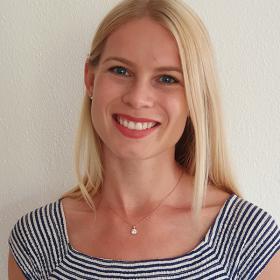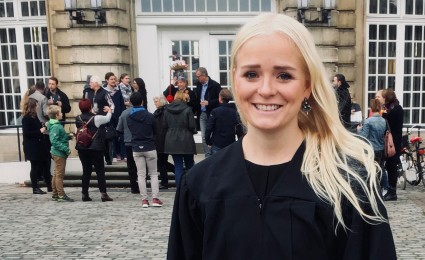

Katja, Senior Consultant
Maths
"The positive and motivational working environment in consulting, in combination with the possibility to work in a broad range of data-related topics in different industries, made me choose to start my career in consulting. "
What educational/academic background do you have?
I have a background in mathematics from RWTH Aachen University. In my bachelor's degree, I was educated in rather theoretical mathematics while minoring in physics, and in my master's degree I focused on statistics and minored in economics. During my master's studies, I spent a year abroad in the south of France, where I attended seminars on applied statistics and data analysis before completing my master's thesis in the field of randomized controlled trials at the Institute of Medical Statistics at RWTH Aachen University.
Why did you decide to go into consulting?
During my studies, I had already done an internship in consulting and really appreciated the positive and motivational working environment. This working environment in consulting, in combination with the possibility to work in a broad range of data-related topics in different industries, made me choose to start my career in consulting. The recruiting process at Roland Berger was very agreeable and I was very curious about the opportunity to be part of the developing data and analytics team at Roland Berger, so the job at Roland Berger seemed like the perfect fit for me.
What is or has been the biggest challenge for you in consulting?
With a technical background, the starting phase in consulting can be quite challenging – especially when you're working on rather non-technical topics. During my first months in consulting, I had to learn about the importance of communication and the presentation of results. You can create the greatest quantitative results – but their full potential can only be leveraged if you are able to communicate them appropriately to the target audience so that the stakeholders are able to act upon them.
What did you learn that you will never need here?
A lot – I do not think that I will ever need to prove the continuity of a function with an epsilon-delta criterion. However, the endurance that I learned conducting these kinds of proofs helps me frequently in my consulting life.
Which of your skills from your background makes your consulting life easier?
As a mathematician, I constantly faced new problems and was required to find a way to solve these problems. This demanded new ideas and approaches, as few proofs resemble each other. As a result, I am very flexible at integrating new ideas and approaches during the course of the project that improve the project's outcomes and impact.
What did you want to be as a child and what would you love to be today if you weren't a consultant?
I was all into sports, so I would have really loved to be a professional athlete. As my passion was running track and I knew that there were not many places in the Olympics, my plan B was to be either a professional coach or to teach sports in school. However, I always liked mathematics back in school!
How does your team benefit from your skills?
As a mathematician, I bring both the foundation for quantitative topics and analysis and also the ability to quickly familiarize myself with new topics. I am working on a functional platform, so I have worked in very diverse industries – this learning ability helps me quickly encompass the entire problem and setup. Moreover, I think a project can only be successful if everyone in the team is committed and moves in the same direction – a positive and collaborative working atmosphere is key for a successful project. Therefore, contributing to a positive team atmosphere is very important to me.
What has been your favorite moment/project since you joined Roland Berger as a consultant?
This is a difficult question as there have been many inspirational moments. I think the most valuable moments are when you see that your work has created sustainable results. For example, I developed a tool during a project a few years ago. A few months ago, I worked for the same client and was able to see that the tool was in everyday use by the client. There are, of course, many memorable moments with the team – naming only one is impossible.






